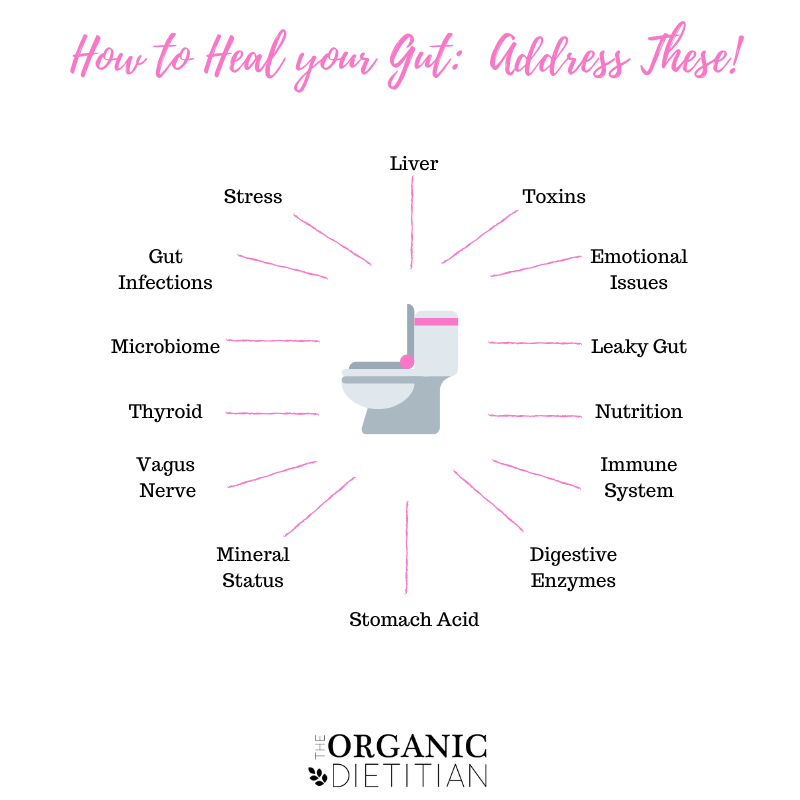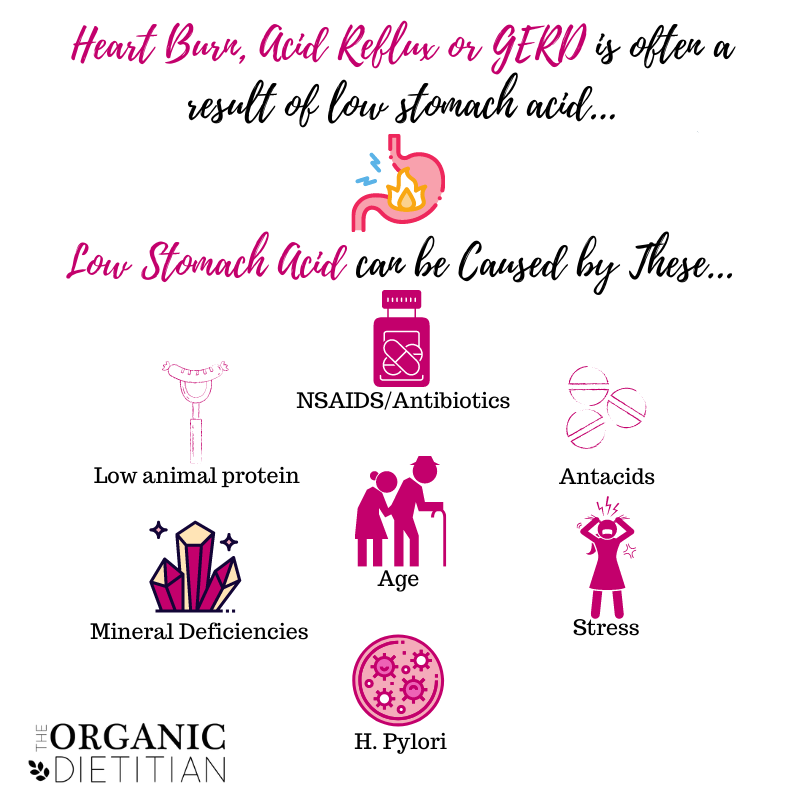Beyond Probiotics: 10 Key Factors in Healing Your Gut
Well it’s no big secret that a healthy gut is essential for overall health and wellness — studies have linked gut health to:
- The immune system
- Autoimmune conditions
- Mental health
- Hormonal balance
- Heart health
So no wonder you’ll hear the term “gut healing” thrown around quite a bit in the health and wellness world.
But what exactly does “gut healing” mean? What’s required?
When I was working to heal my gut and remedy my chronic bloating, I thought I was doing everything right. I was drinking bone broth plus taking probiotics, digestive enzymes, and L-glutamine.
Just as gut health impacts so many other aspects of our physical health, it runs in the other direction too!
Gut health extends far beyond popping a probiotic and sipping on some bone broth, and there was so much I was missing.
It wasn’t until I started considering the other pieces of the puzzle that I finally felt relief and was able to truly heal my gut. There are numerous considerations, but lets talk about the top 10 today!

10 Key Factors In Healing Your Gut
Gut infections
Bacteria, fungus/yeast, H.pylori, parasites, worms, and viruses are much more common than you may think and they can all damage the gut and prevent healing if not properly identified and addressed.
Unfortunately, these can often be difficult to identify without the proper testing in combination of assessing symptoms. The Organic Dietitian team uses the GI Map to get a comprehensive picture of the gut microbiome, including the “bad guys” that may be preventing healing while taking you and your symptoms into account too.
Microbiome
Are you low in the healthy or “good” bacteria that resides in the gut microbiome?
Yes, this is where probiotics come into the picture! Just as important to consider: prebiotic fiber to keep the beneficial bacteria thriving.
Related Post: How Probiotics Work (and Why They May not Fix Your Digestion)
Thyroid
Poor thyroid function can decrease motility in the gut and contribute to constipation. Thyroid issues are very common yet go largely undiagnosed. We often experience symptoms like cold hands and feet, fatigue, hair loss, constipation, dry skin, or weight loss resistance which can all be signs of a sluggish thyroid. Yet get testing (improperly by the way) and are told the thyroid looks “normal.”
Stress
Chronically high levels of the stress hormone cortisol can break down the protective lining of the gut and suppress stomach acid production, key for proper digestion.
We see this all the time in The Organic Dietitian practice and it’s something to really consider. So many of us tend to write stress off as “normal” even when it may be running out of control. But it isn’t enough to try to supplement, we need to address as many internal and external stressors as possible to support the adrenals. We help our clients investigate where there stressors are coming from and how to minimize them as much as possible.
Minerals
Essential minerals like magnesium, zinc, and selenium can impact the gut. Unfortunately, most people are deficient in these minerals.
Ironically, impaired gut function can prevent proper absorption of nutrients like these minerals! While working to heal your gut, a healthy diet and smart supplementation can help. We like to run HTMA (hair tissue mineral analysis) tests with all our clients to help assess mineral status.
Stomach acid
With all the anti-acid medications on the market, we’re led to believe that stomach acid is a bad thing. But this couldn’t be further from the truth!
Not only is adequate stomach acid required for digestion and so digestive health, but it also protects against pathogens. There are many possible reasons for low stomach acid so investigating your root causes is key!

Digestive Enzymes
Like adequate stomach acid, digestive enzymes are required for proper digestion. Low levels can contribute to indigestion, inflammation in the digestive tract, and malabsorption.
Leaky gut, toxins, stress, inflammation, and low stomach acid can all contribute to a deficincy in digestive enzymes.
Nutrition
It should be no surprise that an unhealthy diet does nothing good for the gut! It can cause inflammation, throw the gut microbiome off balance, and decrease stomach acid production.
Did you know fiber can be like sandpaper to an inflamed gut? So what specifically is a “healthy” diet for someone trying to heal their gut might be completely different from what you think.
Liver Health
Your liver is actually part of your digestive system and helps make bile so you can break down fat. If the liver isn’t properly creating or releasing bile, it can lead to indigestion and inflammation in the digestive tract.
Related Post: Keep your Liver Healthy with these 5 Support Tools
Toxins
Gut microbes are quite vulnerable to harm from external influences such as environmental toxins. We can’t eliminate toxins 100% but we can work to minimize our exposure as much as possible. How exactly to reduce toxins is something we address when we work with all our clients because it is that important for all areas of health including the gut.
Navigating and addressing digestive issues and gut health can be complex, confusing, and frustrating when you try to go it alone.
But it’s our job to take all the guesswork and stress out of the equation for the women we work with.
Ready to dive deep into your health? To take a root cause approach to your digestive health and symptoms? To know exactly what your body needs for true healing?
Now let’s keep the conversation going in the comments below!
Do you struggle with digestive health?
Other related symptoms?
Have you started your gut healing journey?
Have you considered the 10 factors discussed here?
Any questions?
Please let us know so we can continue guiding you in your gut health journey!
The post Beyond Probiotics: 10 Key Factors in Healing Your Gut appeared first on The Organic Dietitian.
Original source: https://theorganicdietitian.com/key-factors-in-healing-your-gut/
Comments
Post a Comment